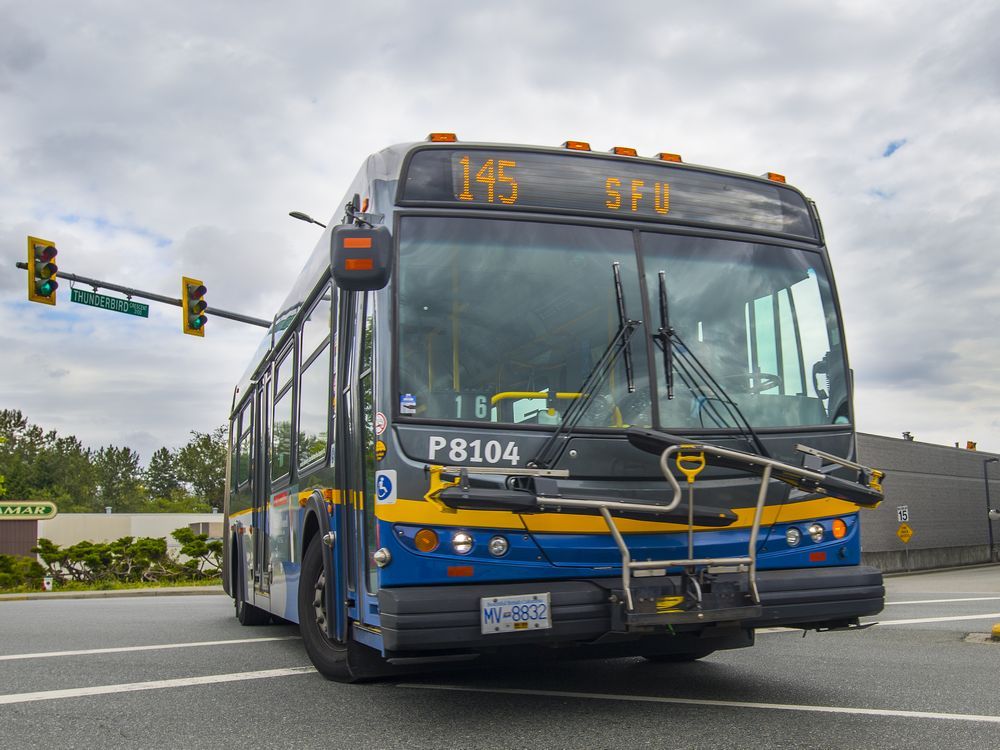Roads will be more congested during morning rush if bus, SeaBus shut down

Credit to Author: Jennifer Saltman| Date: Mon, 25 Nov 2019 17:00:22 +0000
Up to 36,000 more cars could end up on Metro Vancouver roads during the morning rush later this week when bus and SeaBus services are shut down due to strike action, according to transportation modelling from TransLink.
Workers who operate and maintain the buses and SeaBuses are scheduled to walk off the job Wednesday, Thursday and Friday, with regular service resuming on Saturday, Nov. 30. SkyTrain, Canada Line, West Coast Express and HandyDART will still operate normally, though likely with some congestion and delays.
To date, bus drivers have refused to wear uniforms every day since Nov. 1 and have refused to work overtime for three days. Another day of overtime refusal is set for Friday. Maintenance workers have been refusing overtime since Nov. 1.
This has resulted in numerous trip cancellations for buses and SeaBuses.
Talks between the union representing the workers and Coast Mountain Bus Company, the employer and an operating company of TransLink, have broken down twice.
On Monday, TransLink released information about how the shutdown will affect the region’s transit users.
More than 250,000 daily transit journeys — a complete transit trip that could include a number of transfers — use only buses and about 18,000 include a ride on the SeaBus. More than 11,000 people use the SeaBus on a typical fall workday, almost half of whom are North Shore residents.
There are more than 500,000 boardings on the SkyTrain system each day, and more than half of those use bus or SeaBus to get to or from the train.
There are more than half a million jobs that are within a 10-minute walk of the bus network, and for some major employment areas — the University of British Columbia, the Broadway corridor, southwest Coquitlam, Tilbury and Annacis islands, and Big Bend and Discovery Place in Burnaby — the bus is the only transit option.
Many who usually rely on transit to get around will end up taking their cars, which could put up to 36,000 vehicles on the road during the morning rush, according to transportation modelling.
Those who use bus as part of their commute and don’t have a driver’s licence or own a vehicle — 60 per cent of workers — will have to find another way, which could include carpooling, car sharing, walking or biking.
Users who don’t have vehicles include students and people with lower incomes.
Bus passengers tend to be young adults, with 41 per cent being between the ages of 17 and 34. About 76,000 UBC and Simon Fraser University students regularly use the bus to get to the Point Grey and Burnaby Mountain campuses, along with other campuses in the region.
Twenty-five per cent of bus passengers are from households with an income of $40,000 per year or less.
In the labour dispute between bus and SeaBus workers and the company, wages are a major sticking point, along with working conditions for bus drivers.
Coast Mountain has offered a 12.2-per-cent pay increase for skilled trades over four years, and a 9.6-per-cent pay increase for transit operators over the same period. Unifor had sought an increase of 15.2 per cent over four years for bus drivers and 16.7 per cent over four years for maintenance workers, and parity with drivers in other jurisdictions and maintenance workers within the transit authority.
Under the current contract, conventional bus drivers start at $22.83 an hour during a 30-day training period, then go from $24.46 an hour to $32.61 an hour after 24 months of employment.
On the issue of working conditions for bus drivers, the company offered, for the first time, guaranteed recovery time. Drivers would receive 40 minutes of recovery time per shift and be paid double for every minute of the recovery time missed because of traffic.
SkyTrain attendants, control operators, administration, maintenance and technical staff took a strike vote last week and 96.8 per cent of workers voted to strike. However, bargaining with the B.C. Rapid Transit Company resumed over the weekend and mediated discussions are scheduled to begin on Thursday.
The main concerns are wages, staffing levels, forced overtime and sick leave. The company has offered a two-per-cent wage increase per year, but the union has not divulged what it is seeking.
Wages for SkyTrain workers vary based on a person’s duties. On the low end, a receptionist or data-entry clerk makes $24.95 per hour, and a customer service attendant makes $26.43 per hour, while an escalator/elevator technician, the highest-paid tradesperson, makes $49.94 per hour.